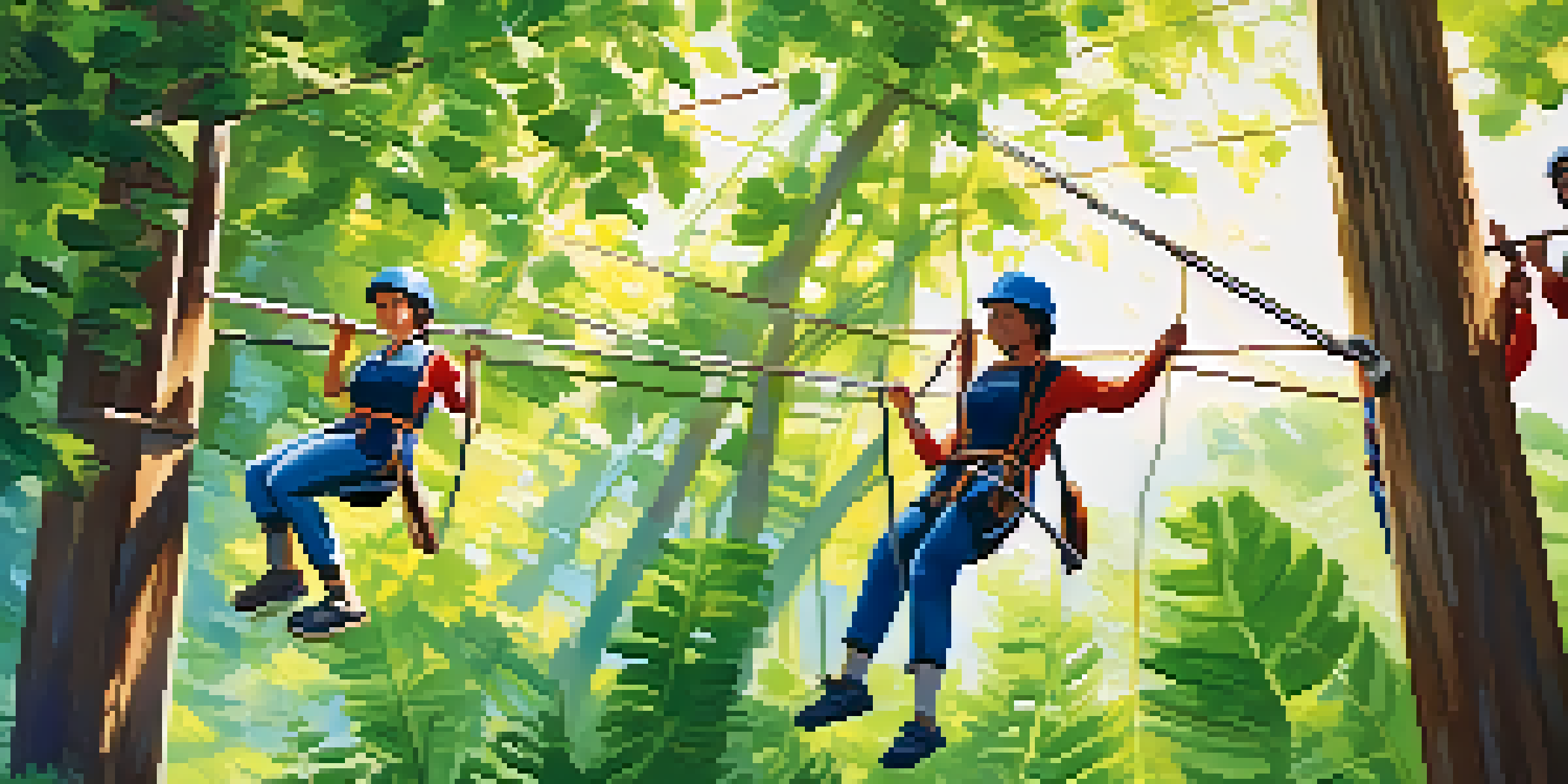Building Teamwork Skills Through Outdoor Challenges

Understanding the Importance of Teamwork Skills
Teamwork skills are vital in any organization, helping teams to collaborate effectively and achieve common goals. These skills include communication, trust, and conflict resolution, which are essential for a productive work environment. Without strong teamwork, projects can falter, leading to missed deadlines and decreased morale.
Alone we can do so little; together we can do so much.
Outdoor challenges offer a unique setting for team members to build these skills outside the usual office dynamics. When placed in unfamiliar situations, individuals must rely on each other, fostering a sense of camaraderie. This shared experience can break down silos and encourage open communication among team members.
Moreover, teamwork in outdoor settings can reveal individual strengths and weaknesses, allowing for personal growth and development. For instance, someone who typically takes a backseat in meetings might emerge as a natural leader during a hiking challenge. Such revelations can lead to better role allocation within the team, ultimately enhancing productivity.
Types of Outdoor Challenges to Enhance Teamwork
There are various outdoor challenges that can effectively promote teamwork skills. Activities such as rock climbing, obstacle courses, or team sports can engage participants in ways that foster collaboration. Each challenge presents unique obstacles that require collective problem-solving and strategic planning.

For example, a ropes course not only tests physical endurance but also encourages teams to communicate clearly and support one another. Participants must work together to navigate the course, building trust as they rely on each other for safety and encouragement. These moments can spark deeper connections among team members.
Teamwork Skills Are Essential
Effective teamwork skills, such as communication and trust, are crucial for achieving common goals in any organization.
Additionally, outdoor scavenger hunts can promote creativity and teamwork, as groups must devise strategies to find items or complete tasks. This type of activity encourages not just cooperation but also competition in a fun, relaxed atmosphere, reinforcing the bond among colleagues while honing their teamwork skills.
The Role of Communication in Outdoor Activities
Effective communication is the backbone of successful teamwork, and outdoor challenges can enhance this skill. When teams face physical tasks, they must articulate their thoughts and intentions clearly, ensuring everyone is on the same page. This practice can translate back to the workplace, where clear communication is equally crucial.
The strength of the team is each individual member. The strength of each member is the team.
During outdoor activities, team members learn to express their ideas and listen actively to others, fostering an environment of respect and understanding. For instance, when strategizing how to tackle a climbing wall, everyone’s input is valuable, and each voice matters. This experience can empower individuals to speak up in meetings, knowing their contributions are appreciated.
Moreover, outdoor challenges often require real-time decision-making, which reinforces the importance of concise and effective communication. Teams learn to quickly assess situations and respond appropriately, honing their ability to navigate challenges both outdoors and in the office.
Building Trust Through Shared Experiences
Trust is a fundamental component of successful teamwork, and outdoor challenges are excellent for cultivating this vital element. When team members face physical challenges together, they learn to rely on one another, fostering a sense of safety and mutual support. This shared experience can create lasting bonds that enhance workplace relationships.
Consider a scenario where individuals must work together to cross a river using only a few planks of wood. This challenge requires trust in each other’s abilities, as everyone’s safety depends on collective effort. Successfully overcoming such obstacles can lead to heightened trust levels that carry over into their daily interactions.
Outdoor Activities Foster Growth
Participating in outdoor challenges enhances teamwork by revealing individual strengths and promoting collaboration.
As trust builds, team members may feel more comfortable sharing ideas and taking risks, knowing they have each other's backs. This newfound confidence can lead to increased innovation and creativity in the workplace, as individuals are more likely to contribute their unique perspectives.
Fostering Problem-Solving Skills in Teams
Outdoor challenges often present unexpected problems that require teams to think on their feet. Navigating through a dense forest or finding a path during a hike demands quick thinking and adaptability. These experiences can sharpen a team's problem-solving skills, which are crucial in any workplace.
For example, if a team encounters a blocked path during a hike, they must collaborate to find an alternative route. This scenario encourages brainstorming and collective decision-making, allowing team members to practice evaluating options and considering different perspectives. Such skills are invaluable when tackling complex projects in the office.
By engaging in these outdoor challenges, teams can develop a toolkit of strategies for problem-solving that they can apply in their everyday work. The ability to address challenges confidently and collaboratively can lead to more efficient project execution and a more resilient team.
Encouraging Leadership Development Through Challenges
Outdoor challenges also present opportunities for leadership development within teams. When faced with a task, individuals often naturally step into leadership roles, guiding their peers through the challenge. This experience can help identify potential leaders who may not have had the chance to shine in a traditional office setting.
For instance, during a team-building hike, one person might take the initiative to map out the journey and lead the group. This not only showcases their ability to organize and motivate but also allows others to observe and learn from their leadership style. These moments can spark discussions about leadership qualities and how they can be nurtured within the team.
Trust Enhances Team Dynamics
Building trust through shared outdoor experiences leads to stronger relationships and improved innovation in the workplace.
Furthermore, participating in outdoor challenges can help individuals develop confidence in their leadership abilities. By stepping outside their comfort zone, they learn to trust their instincts and decisions, which can translate to improved leadership skills back at work, ultimately benefiting the entire team.
The Lasting Impact of Outdoor Challenges on Team Dynamics
The benefits of outdoor challenges extend beyond the activities themselves, creating lasting impacts on team dynamics. The bonds formed during these experiences can lead to improved collaboration and communication in the workplace. Team members often return to the office with a renewed sense of connection and purpose.
As teams reflect on their experiences, they can draw parallels to their daily work, identifying how they can apply what they’ve learned. This reflection can lead to actionable changes in how they approach projects or communicate with one another, fostering a more cohesive team culture.

In the long run, investing in outdoor challenges can result in a more engaged and motivated workforce. When employees feel connected and supported by their peers, they are more likely to contribute positively to the organization’s goals, leading to higher productivity and job satisfaction.